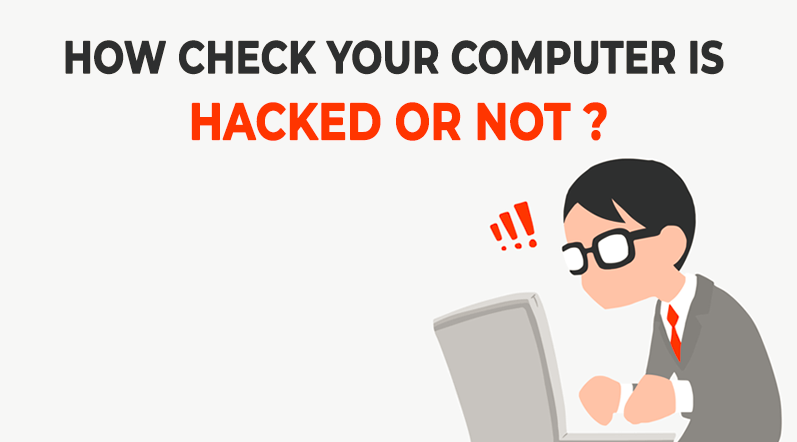Hacking has become one of the serious concerns in cyber security crime today. The hackers always stood beside you and gather all your personal information and want to control your devices. The hackers usually want anything that can get their hands on.
Now, you might be feeling scared? Well, hacking personal devices is a serious threat to cyber-security. Though it not as much threatening as you might imagine. In most cases, the legitimate concern is warranted. And at other times you are dealing with just nuisance.
So, how to tell if my computer has been hacked?
If your computer is hacked you might see the following symptoms:
1: Your windows will frequently get popped-up, and especially the ones that encourage you to visit unusual sites.
2: Changes to your home page.
3: Mass emails get sent from your e-mail account.
4: Some frequent crashes usually get happen and slow down your computer performance.
5: The Unknown programs get start-up when you try to start your computer.
6: Programs automatically get connected to the Internet.
7: Unusual activities like password changes.
This way you can check if your computer is hacked or not.
Some Basic forms of Hacking:
A: Identity Theft: If a hacker can try to steal certain pieces of information like your identity, name, address, birth date then he must be impersonated and take money from your account. This is known as Identity Theft.
The hackers heal all identities from your digital devices and looking for your PII (Personal Identifiable Information). Particularly the hackers sell your PII to someone else and engage a fraud identity against you.
B: Phishing: In a Phishing attack, the hacker tries to trick you while clicking onto a link in an e-mail or text message that sends you to a website. Due to this, it downloads malware onto your device and fools you into revealing your personal information via a bogus web form.
It is sad to hear that Phishing attacks have grown sophisticated with the attackers and create the perfect copies of websites, banks, airlines, and so forth.
C: Spreading Viruses:
You might be glad to know that hackers are frequently achieving their goals by scattering viruses or other malware. The viruses steal all resources from your legitimate use of the device and make it sick, slow, and unresponsive. In some cases, the virus will be designed to destroy the data and make the device completely unusable.
D: Malware: It is a related form of malicious software and is usually designed to carry a specific task. It might gather all your data and send it off to the hacker. Moreover, it spies on your usage habits for a variety of malicious reasons.
E: Ransomware: This is a form of malware and encrypts all your files. It makes them inaccessible and thus you pay the hacker a ransom. After that, the hacker unlocks your files so that it can again get usable for you.
F: Cryptojacking: Sometimes hackers take your device so that use it for cryptocurrencies like Bitcoin. In Cryptojacking the hacker will embed malware in your system and uses the CPU and network connections for achieving cryptocurrencies.
Cyber attacks are very often and everyone gets worried about the safety of their data. For preventing your passwords and other important data from being stolen you need to pay attention to any changes on your computer.
Take a look at the following steps and learn how to check if your computer has been hacked:
1: Anti-virus should be switched off:
If you do not turn off your anti-virus and noticed that it is off. Then your computer device is more likely to be hacked. Also, it cannot be turned off on its own. The first thing that hackers do is to shut down the anti-virus and get easy access to your files.
2: Passwords won’t work:
If you didn’t change your password but they have suddenly stopped working and you cannot access your accounts. Then you should be alert as your computer is most likely to hack.
3: New icons start appearing:
When you launch your browser you start noticing about the new icons on your device dashboard. This must be a sign of the infiltration of some dangerous code into your computer.
4: Cursor moves on its own:
If you start noticing that the position of your cursor is randomly moving and is highlighting something, then it signifies that your computer is hacked.
5: Printer won’t work properly:
The cyber attacks not only influence computer devices but printers too. For example, you get automatically print outs from the printers even though you didn’t want it.
6: Forwarded to different websites:
If your browser keeps you forwarding to different websites then it’s time to get alert! This situation same goes when you type something into search engines and goes to another page that you don’t know. Besides it, if you see pop-up windows then it’s often that your computer is hacked.
7: Files get deleted by someone else:
Your computer is hacked if you start noticing that some of your device programs or files get deleted without your knowledge.
8: Personal data gets viral:
Examine this by using your search engine. Look for the information about yourself that you didn’t put on the internet. However, if you find it then shows your computer is hacked for stealing the information or some personal details about yourself.
9: You started to receive fake anti-virus warnings:
If you see the rapid warnings of anti-virus then it is a clear sign of hacking. Some other bad sign is if you have a new anti-virus that you didn’t install.
10: Unusual behavior of web-cam:
Try to check your webcam if its indicator starts blinking on its own. Then reboot the computer and see if it’s blink again in 5-10 minutes then it is a clear indication that your computer has been hacked.
11: Computer works more slowly:
If you find that the simplest operations take a long time to complete then there is a possibility that your computer has been hacked. Also, if you notice that there is a drop in the speed of your internet connection then it means that somebody has hacked your computer.
My computer is hacked how I fix it
It can be really frustrating if you find out that your computer is hacked. However, computer hacks are pretty much common in this technological era. According to a survey, a hack happens every 39 seconds. Here are some of the reasons that why your computer was hacked in the first place:
- You opened suspicious email attachments.
- Your operating system (OS) was not up to date. You did not install the latest updates on your computer.
- You were not using strong ids and passwords.
What to do if your computer has been hacked?
If you find out that your computer is hacked, the first thing that you have to do is not to panic. Here is what else you can do if your computer gets hacked:
- Reset your passwords.
- Sign out of all the online accounts.
- Turn off the WiFi and disconnect from the internet.
- Remove any external hard drive or USB stick from your computer.
- Run antivirus on your computer to scan computer for malware and viruses.
- Inform your friends and family and others in your contact list about the hack that happened to your computer.
- Check closely your credit and financial account information.
- Install security software on your computer.
How to unhack your computer?
Malicious software or a malware can hack your computer. Once you come to know that your computer is hacked, you first should understand the nature of the hack. Then you can perform the following steps to unhack your computer:
- Disconnect your computer completely from the internet. Turn off the WiFi connection and remove all the Ethernet cables. Disconnect your router also.
- Next thing to do is to remove and clean the Hard Drive. For cleaning the Hard Drive, you can use the Malwarebytes and ESET type powerful security programs. Connect the hard drive to second computer and run a scan with the antivirus program installed on it.
- Reinstall your Operating System and the system security software. Once the cleaning of the hard drive is done, put it back in the main computer and reinstall the operating system as well as the system security software.
- If you find out that that has been changes in your financial information, then immediately contact your bank and payment processors. Your bank can help you recover some of your lost funds.
- Immediately reset all your passwords and set up multi-factor authentication to boost the security. Choose a stronger password and change it on a regular basis.
- Use VPN to prevent any malware infections in the future. VPN can help to encrypt the web traffic.
In a nutshell, preventing your device from getting hacked is not so difficult. As such there are no absolute protections but some basic and absolute protections can do a great job to protect you. One thing that keeps the operating system secure is to make your software updated. Microsoft resolves all the issues for security flaws every week. Moreover, If you’re looking to perform a clean installation then installing window 10 is highly recommended.
Also Read: 35+ Best Profile Creation List




